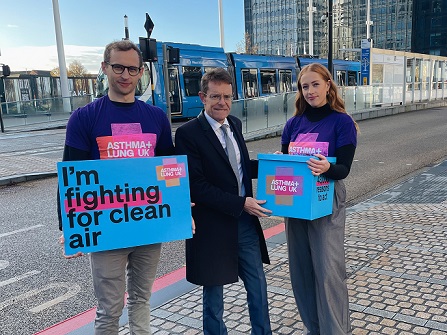A region-wide plan setting out a raft of measures to significantly improve air quality and the health of local people was launched by the West Midlands Combined Authority (WMCA) which began with a series of priority measures that will be delivered with £1 million of government air quality funding and include:
- Installing a network of air quality sensors that will provide real-time, publicly accessible data on pollution levels across the region
- Education and awareness campaigns in communities, including schools, to improve knowledge and understanding of main sources of pollution and their health impact
- Development of an alert system when pollution levels are high
- Research into the potential to positively impact air quality through speed limit reductions on high-speed roads and in urban centres
- Devising regional targets that exceed current national and international guidelines on levels of PM2.5 and PM10 particulates, and nitrogen dioxide (NO2)
These initial measures will be delivered over the next two years and are part of the WMCA’s wider Air Quality Framework – a longer-term document that sets out measures that must be considered in partnership with local authorities, central government, businesses and local communities to accelerate improvements to air quality on a regional scale. The Framework focuses on reducing high levels of harmful microscopic particles in the air, known as PM2.5 and PM10, that come from things like wood-burners, factories and tyre dust.
These particulates can cause illnesses like asthma, coronary heart disease, stroke, and lung cancer, with long-term exposure also estimated to be responsible for 2,300 premature deaths every year in the West Midlands. The adverse health effects of poor quality air have led to hundreds of local people - many with lung conditions impacted by air pollution - signing a petition calling on local leaders in the region to prioritise improving air quality.
The petition has been handed to Andy Street, Mayor of the West Midlands and WMCA chair, by representatives from Asthma + Lung UK, who said: “We all want and deserve to breathe clean air but sadly there are still 2,300 premature deaths every year in our region due to air pollution.
“This demonstrates the need to take further action to address this issue. That’s why we’ve drawn up a plan - in close collaboration with our local authority partners - that is backed by an initial £1m of government funding. We acknowledge and understand the depth of concern shown by local people - evident from the numbers who have signed Asthma + Lung UK’s recent petition.
“We’re committed to delivering solutions that ensure we’re leading the way when it comes to cleaner air. Together, we can make the West Midlands a place where local people benefit from the unmatched purity of our air in the months and years ahead.”
Improving air quality is already a key part of the WMCA’s long-term commitment to reducing health inequalities and improving the region’s environment. The WMCA’s Natural Environment Plan is maximising the potential of biodiversity in enhancing air quality through tree planting and grants for locally led nature projects.
Significant progress is also being made to green the region’s transport network thanks to the WMCA’s support for the rollout of electric buses and the creation of more safe cycling and walking routes. Building on this existing work, the WMCA’s Air Quality Framework sets out 148 measures including the acceleration of retrofitting homes to specifically support the transition from gas central heating to improve indoor air quality, developing a journey planner that provides information on best routes based on lowest levels of air pollution and creating air quality innovation zones to test new ways of providing cleaner air.
Councillor John Cotton, WMCA portfolio lead for environment and energy, and leader of Birmingham City Council, said: “Poor air quality remains the single biggest environmental risk to public health.
“The health impacts are significant and disproportionately affect people living in deprivation, the very young and the old. We all have an obligation to take action to reduce the sources of this pollution and all local authorities in the West Midlands are already delivering their own plans.
“Coming together and seeing how we can combine those efforts and work together on new collective solutions will ensure we are doing everything possible to provide the people of our region with the best opportunity to realise their full potential.” Tim Dexter, clean air lead at Asthma + Lung UK, said: “We welcome this new plan to address harmful levels of air pollution in the West Midlands. A bold and united approach is essential to protecting lung health in communities across the region.
“With hundreds of signatures from local residents, our petition highlights the need for local leaders to make tackling air pollution a top priority. This plan is a step towards guaranteeing everyone in our towns and cities can breathe cleaner air and have a healthier future.”
Kirsten de Vos, a Birmingham-based member of Mums for Lungs, which aims to reduce air pollution and its health impacts on children and babies, said: “Mums for Lungs welcomes the WMCA’s Air Quality Framework and the ambition within it.
“With air pollution contributing to 1,000 deaths a year in Birmingham alone, it is clear there is much to do to bring air pollution levels down. We look forward to seeing positive outcomes for the health of children of the West Midlands once this Framework is implemented.”
Founder of the Clean Air Justice Network, Waseem Zaffar, said: “Poor air quality continues to blight too many lives and we will fully support this framework as it seeks to use all available levers to tackle air pollution in our communities.
“This must remain our priority, while ensuring those who are most vulnerable to unsafe levels of air pollution - the least well off and those from BAME and white working-class communities – are fully supported to tackle a problem that we know contributes to health inequalities.”











